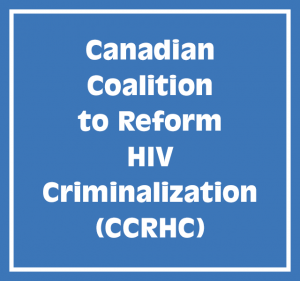
Via the Canadian Coalition to Reform HIV Criminalization
July 27, 2022 — Today, the Government of Canada announced new community consultations as Canada finally looks to reform the misguided law on HIV non-disclosure.
The Canadian Coalition to Reform HIV Criminalization (CCRHC) welcomes this announcement, which comes after several years of community advocacy.
Advocates have long called for an end to the unscientific and discriminatory laws that criminalize people living with HIV. As the law currently stands, people living with HIV can be charged with aggravated sexual assault, listed on the sex offender registry, and spend years in prison for allegedly not telling their sexual partner of their HIV status in certain circumstances. People living with HIV continue to be criminalized in cases where there was little to no possibility of transmission, no intent to transmit, and no actual transmission.
Criminalization has significant impacts on the lives of people living with HIV. Many of those who have faced charges or been found guilty experience barriers to housing and employment, social exclusion, increased risks of violence and abuse, and psychological harms. The law also disproportionately affects Black, Indigenous, and gay communities.
The Government of Canada’s consultations are a step in the right direction. However, it’s critical that the Government recognize that we are not starting from scratch: over the past five years, the CCRHC has conducted two extensive national consultations on HIV criminalization with the HIV community. First, starting with several months of cross-country community consultations in 2016, the CCRHC released a Community Consensus Statement in 2017. This statement was endorsed by more than 170 organizations across Canada, from the HIV sector and beyond, and clearly showed community support that the law should only be used as a measure of last resort. These organizations agreed that criminalization increases HIV stigma and is at odds with both public health objectives and scientific knowledge about HIV transmission. The statement urged the federal government to take immediate action to reform the law on HIV non-disclosure. To do otherwise flies in the face of the principles of justice and the scientific evidence.
Answering these calls, Justice Canada released a report on World AIDS Day 2017, Criminal Justice System’s Response to Non-Disclosure of HIV, which publicly criticized the “overcriminalization of HIV” as contributing to stigma and undermining an effective HIV response. In 2019, the House of Commons Standing Committee on Justice and Human Rights agreed and concluded that a more limited application of the criminal law is warranted. But since these reports, political leaders have not acted to limit the overly broad use of the law and people living with HIV still face the threat of prosecution and imprisonment based on their health status.
As we wait for government action, the community has continued to mobilize. In the fall of 2021, the CCRHC organized another Canada-wide consultation with people living with HIV, HIV organizations, service providers, women’s rights advocates, and other scientific experts. These consultations once again showed a clear consensus that criminalization in cases of alleged HIV non-disclosure is a poor public health and human rights response. The community has developed a set of proposals based on the CCRHC consultations to significantly limit the use of the law, which will be released on Friday, July 29th, at the 24th Annual International AIDS Conference in Montreal. We call on the Government of Canada, yet again, to take our recommendations seriously and act quickly to limit the use of the law to cases of actual and intentional transmission of HIV and to remove HIV non-disclosure from the laws of sexual assault.
People living with HIV in Canada deserve to live in a country where HIV is not a crime.
To learn more visit: www.HIVcriminalization.ca
